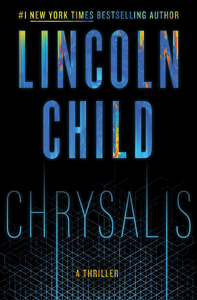Lincoln Child dreams big but keeps things in the bounds of plausibility. “Chrysalis” (July, hardcover) might be his wildest vision of the future, but one I can see happening – and one the author hopes will happen. He says in his acknowledgements: “The simulated world made possible by the Omega Velocity (is) of course imaginary. One hopes this does not remain the case forever.”
Tech-positive
Refreshingly – compared the sci-fi cliché that we should fear technology – in his eighth solo novel, Child again writes about the glorious possibilities of technology, as he was doing back in his 2002 debut “Utopia.” But actually, he hasn’t gone this purely into sci-fi since 2009’s “Terminal Freeze,” so this is a return to his roots.
The Chrysalis corporation is a conglomerate of stand-ins for Apple, Google, Disney, Johnson & Johnson and eHarmony. (Indeed, Chrysalis has purchased Eden, the matchmaking company from “Death Match.”)

“Chrysalis” (2022)
Author: Lincoln Child
Genre: Techno-thriller
Series: Jeremy Logan No. 6
Setting: Chrysalis headquarters, Connecticut, near future
The gorgeous central tower, with spire walkways leading to work facilities constructed against the valley walls, is located in a scoop-shaped crater in the backwoods of Connecticut. Chrysalis functions like a city — with restaurants, movie theaters and bowling alleys — like the seafloor city in “Deep Storm.”
The villains are corporate espionage agents, not the tech itself. “Chrysalis” does toy with the idea of hacking and repurposing of Omega. (Imagine Google Glass, but with little tendrils that lightly tap into your brain. No glasses are needed, only a device that goes behind your ear.)
Logan’s run (through the facility)
But the Chrysalis techs tell investigator Jeremy Logan (in his sixth book) that, no, it’s not possible to turn Omega deadly. As such, Logan looks elsewhere in the facility to find how the corporate terrorists are killing people through Chrysalis’ products.
Logan’s journey into Omega Venture’s VR world is the 2022 answer to the VR scenes from Michael Crichton’s “Disclosure” (1994). Those scenes now play as outdated and bland, although Crichton’s excitement shines through. (The protagonist accesses computer files through a virtual interface, to no advantage other than that it’s cool.)
Child risks that Logan’s VR journey will someday be read as ridiculous, but for now it’s thrilling and plausible. In a light parallel to “Ready Player One,” Logan shops for shoes in a mall that looks real. VR shopping is ideal for items you want to try on before buying.
As a potentially sinister backdrop, Chrysalis is gathering data on its own (voluntary) employees. The Helix is treated like Voldemort – the vast computer network that shall not be named – and it’s literally hidden in the bedrock. But Child doesn’t explore dehumanizing aspects of metadata collection.

What a world
Is the author overlooking the devil in the tech, the ghost in the machine? I don’t think so; he’s proven himself to be a smart writer. This is a case of authorial choice. Child wants to explore the positives that can come from metadata collection; if we want the negatives, we have “Westworld’s” Rehoboam and other fictional options.
And, of course, in the real world, individuals debate how much they want Facebook to know about them. (And how much we want the federal government to know, but we have less personal control over that.)
Child knows corporations hold power in America’s oligarchical system, and therefore corporate spy games will exist. But that’s people going against people. Technology is morally neutral. It’s OK to be excited about the latest Apple or Microsoft device for communicating and accessing data, the author says.
That’s most of the appeal of “Chrysalis.” Logan goes around the facility and learns about the latest tech from characters who are effectively drawn (including his lawyer guide, coolly efficient Claire Asperton) but won’t stick with you after this novel. Logan enjoys the fruits of a multi-billion-dollar facility where he’s an honored, all-access guest – as are we, via the old-fashioned VR of reading.
In the end, a nefarious plot must be solved and overthrown – this is ultimately a thriller, not a guided tour. As is often the case in Child’s sci-fi novels, the narrative can’t quite live up to the world-building. But what a world he has imagined in “Chrysalis.”

